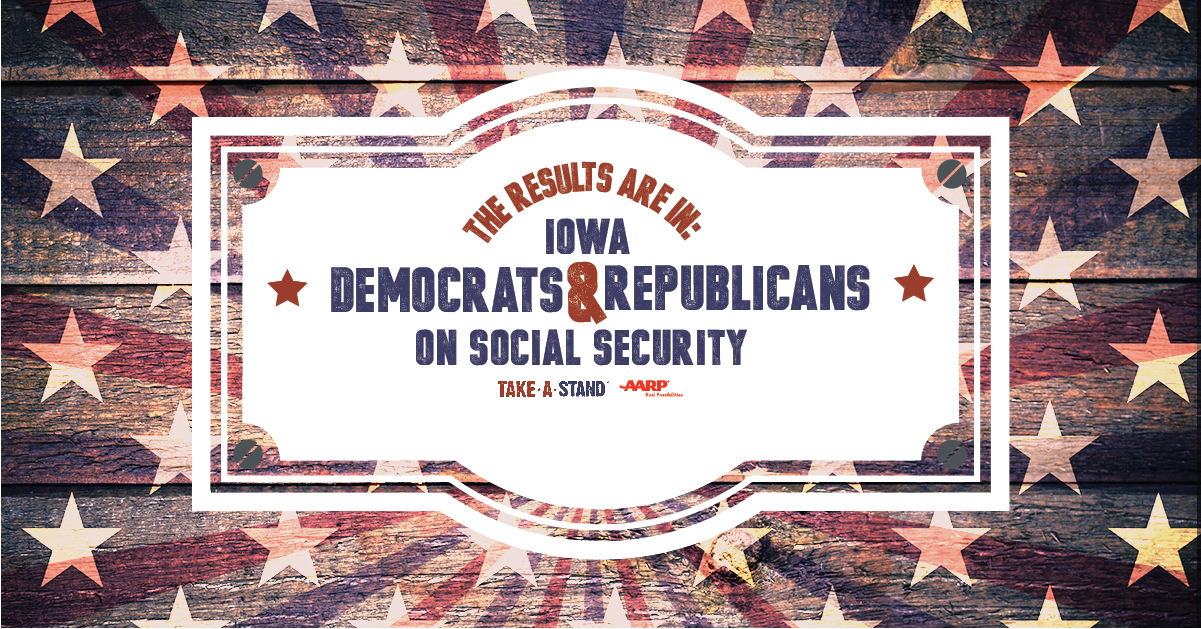AARP Eye Center

January 21, 2016 -- In this polarizing election where specifics have been taking a backseat to soundbites, one issue transcends the partisan divide and unites people of all ages – Social Security. According to a new survey released today by AARP, more than nine in 10 Iowa caucus goers across party lines and age groups say it is important for presidential candidates to lay out their plans to make Social Security financially sound for future generations.
“Iowa caucus goers are sending a clear message to the presidential candidates that having a plan to keep Social Security strong is a test of leadership,” said AARP State Director Kent Sovern. “Yet, some presidential candidates are dodging the issue. Our survey confirms Iowa caucus goers agree if a candidate thinks they’re ready to be president, they should at least be able to tell voters where they stand on Social Security’s future.”
Between January 4 -8, 2016, AARP surveyed 1,007 likely Iowa caucus goers age 18 and older (503 Democratic caucus goers; 504 Republican caucus goers) to examine their views on the importance of candidates focusing on Social Security and which candidate they expect to caucus for on Feb.1. The survey is part of AARP’s 2016 presidential election issue campaign, Take A Stand.
On the importance of candidates focusing on Social Security - across all age groups and party lines – the survey shows:
- More than 9 in 10 Iowa caucus goers think it is important for presidential candidates to have a plan for the future of Social Security. This includes 95% of Democratic caucus goers and 92% of Republican caucus goers. Regardless of age, more than half of all likely caucus goers think this is “very important.”
- More than 8 in 10 Iowa caucus goers agree that having a plan for Social Security is a basic threshold for presidential leadership. This includes 88% of likely Democratic caucus goers and 86% of likely Republican caucus goers.
- More than 9 in 10 Iowa caucus goers believe it is important that the next president and congress take action to make Social Security financially sound. This includes 94% of Democratic caucus goers as well as 94% of Republican caucus goers.
“If our leaders don’t act, future generations could see their Social Security benefits cut by $10,000 per year. This survey confirms how critical it is for the next president to have a plan to update Social Security and a commitment to act on that plan,” said Sovern.
When asked if they have heard enough about the candidates’ plans for the future of Social Security, many Iowans say they would like to hear more.
- Among Democratic caucus goers, 51 percent would like to know more about Hillary Clinton’s plans and 38 percent would like to know more about Bernie Sanders’ plans.
- Among Republican caucus goers, 45 percent would like to know more about Donald Trump’s plans and 41 percent would like to know more about Ted Cruz’s as well as Marco Rubio’s plans.
All plans put forward by candidates are posted on the Take a Stand website, www.2016takeastand.org. To date, all but three of the Democratic and Republican candidates have proposed plans.
On the question of which candidate they expect to caucus for on Feb. 1, the survey shows:
- Among likely Democrat caucus goers, Hillary Clinton is the leading choice for president (49 percent), with Bernie Sanders a close second (42 percent). However, 37 percent say they haven’t fully decided which candidate they will support.
- Among likely Republican caucus goers, Ted Cruz is the leading choice for president (31 percent) with Donald Trump coming in second (24 percent) and Marco Rubio third (12 percent). Fifty-seven percent they haven’t fully decided which candidate they will support.
Since the November 2015 launch of the Take A Stand campaign (www.2016takeastand.org ) in Iowa and the other early voting states of New Hampshire and South Carolina, more than 500 member volunteers in these three states, including more than 150 volunteers in Iowa, have been active directly questioning candidates at their events; pressing candidates on social media; and engaging AARP members in the campaign. In addition, AARP has been rolling out a multi-million dollar television and digital advertising campaign in the three early states. AARP is nonpartisan and does not support or oppose any political candidates, nor contribute any money to political action committees, campaigns or super PACs.
Survey methodology: This survey of 1,007 likely Iowa caucus goers was conducted by Mason-Dixon Polling & Research via landline and mobile phones from January 4, 2016, through January 8, 2016. By design, half of the respondents are likely Democratic caucus goers (503) and half are likely Republican caucus goers (504). The margin of error for the full sample of 1,007 is +/- 3.1%, while the margin of error for each subgroup by party (Republican caucus goers or Democratic caucus goers) is +/- 4.5%. A full copy of the survey report is available at www.aarp.org/ia2016.























































